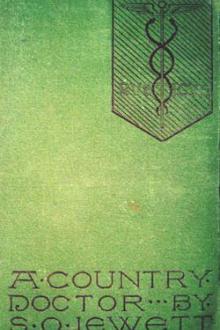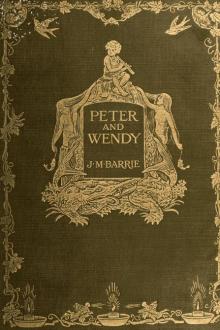A Country Doctor by Sarah Orne Jewett (top novels TXT) 📕

- Author: Sarah Orne Jewett
- Performer: -
Book online «A Country Doctor by Sarah Orne Jewett (top novels TXT) 📕». Author Sarah Orne Jewett
Dr. Leslie was looking at the jade-stone gods. "I suppose the poor fellows who chipped out these treasures of yours may have thought they were really putting a visible piece of Heaven within their neighbors' reach," he said. "We can't get used to the fact that whatever truly belongs to the next world is not visible in this, and that there is idol-making and worshiping forever going on. When we let ourselves forget to educate our faith and our spiritual intellects, and lose sight of our relation and dependence upon the highest informing strength, we are trying to move our machinery by some inferior motive power. We worship our tools and beg success of them instead of remembering that we are all apprentices to the great Master of our own and every man's craft. It is the great ideas of our work that we need, and the laws of its truths. We shall be more intelligent by and by about making the best of ourselves; our possibilities are infinitely beyond what most people even dream. Spiritual laziness and physical laziness together keep us just this side of sound sleep most of the time. Perhaps you think it is a proper season for one at least?"
"Dear me, no!" said Dr. Ferris, who was evidently quite wide awake. "Do you remember how well Buckle says that the feminine intellect is the higher, and that the great geniuses of the world have possessed it? The gift of intuition reaches directly towards the truth, and it is only reasoning by deduction that can take flight into the upper air of life and certainty. You remember what he says about that?"
"Yes," said Dr. Leslie. "Yes, it isn't a thing one easily forgets. But I have long believed that the powers of Christ were but the higher powers of our common humanity. We recognize them dimly now and then, but few of us dare to say so yet. The world moves very slowly, doesn't it? If Christ were perfect man, He could hardly tell us to follow Him and be like Him, and yet know all the while that it was quite impossible, because a difference in his gifts made his character an unapproachable one to ours. We don't amount to anything, simply because we won't understand that we must receive the strength of Heaven into our souls; that it depends upon our degree of receptivity, and our using the added power that comes in that way; not in our taking our few tools, and our self-esteem and satisfaction with ourselves, and doing our little tricks like dancing dogs; proud because the other dogs can do one less than we, or only bark and walk about on their four legs. It is our souls that make our bodies worth anything, and the life of the soul doesn't come from its activity, or any performance of its own. Those things are only the results and the signs of life, not the causes of it."
"Christ in us, the hope of glory," said the other doctor gravely, "and Christ's glory was his usefulness and gift for helping others; I believe there's less quackery in our profession than any other, but it is amazing how we bungle at it. I wonder how you will get on with your little girl? If people didn't have theories of life of their own, or wouldn't go exactly the wrong way, it would be easier to offer assistance; but where one person takes a right direction of his own accord, there are twenty who wander to and fro."
"I may as well confess to you," he continued presently, "that I have had a protégé myself, but I don't look for much future joy in watching the development of my plots. He has taken affairs into his own hands, and I dare say it is much better for him, for if I had caught him young enough, I should have wished him to run the gauntlet of all the professions, not to speak of the arts and sciences. He was a clever young fellow; I saw him married the day before I left England. His wife was the daughter of a curate, and he the younger son of a younger son, and it was a love affair worth two or three story-books. It came to be a question of money alone. I had known the boy the year before in Bombay and chanced to find him one day in the Marine Hospital at Nagasaki. We had been up into the interior together. He was recommended to me as a sort of secretary and assistant and knew more than I did about most things. When he caught sight of me he cried like a baby, and I sat down and heard what the trouble was, for I had let him go off with somebody who could give him a good salary,—a government man of position, and I thought poor Bob would be put in the way of something better. Dear me, the climate was killing him before my eyes, and I took passage for both of us on the next day's steamer. When I got him home I turned my bank account into a cheque and tucked it into his pocket, and told him to marry his wife and settle down and be respectable and forget such a wandering old fellow as I."
The listener made a little sound of mingled admiration and disgust.
"So you're the same piece of improvidence as ever! I wonder if you worked your passage over to Boston, or came as a stowaway? Well, I'm glad to give you house-room, and, to tell the truth, I was wondering how I should get on to-morrow without somebody to help me in a piece of surgery. My neighbors are not very skillful, but they're good men every one of them, unless it's old Jackson, who knows no more about the practice of medicine than a turtle knows about the nearest fixed star. Ferris! I don't wonder at your giving away the last cent you had in the world, I only wonder that you had a cent to give. I hope the young man was grateful, that's all, only I'm not sure I like his taking it."
"He thought I had enough more, I dare say. He said so much I couldn't stand his nonsense. He'll use it better than I could," said the guest briefly. "As I said, I couldn't bring him up; in the first place I haven't the patience, and beside, it wouldn't be just to him. But you must let me know how you get on with your project; I shall make you a day's visit once in six months."
"That'll be good luck," responded the cheerful host. "Now that I am growing old I find I wish for company oftener; just the right man, you know, to come in for an hour or two late in the evening to have a cigar, and not say a word if he doesn't feel like it."
The two friends were very comfortable together; the successive cigars burnt themselves out slowly, and the light of the great lamp was bright in the room. Here and there a tinge of red shone out on the backs of the books that stood close together in the high cases. There was an old engraving or two, and in one corner a solemn bronze figure of Dante, thin and angular, as if he had risen from his coffin to take a last look at this world. Marilla had often spoken of him disrespectfully, and had suggested many other ornaments which might be brought to take his place, but the doctor had never acted upon her suggestions. From the corner of one book-case there hung a huge wasp's nest, and over the mantel-shelf, which was only wide enough for some cigar boxes and a little clock and a few vials of medicines, was a rack where three or four riding whips and a curious silver bit and some long-stemmed pipes found unmolested quarters; and in one corner were some walking sticks and a fishing rod or two which had a very ancient unused look. There was a portrait of Dr. Leslie's grandfather opposite the fire-place; a good-humored looking old gentleman who had been the most famous of the Oldfields ministers. The study-table was wide and long, but it was well covered with a miscellaneous array of its owner's smaller possessions, and the quick-eyed visitor smiled as he caught sight of Nan's new copy of Miss Edgeworth's "Parent's Assistant" lying open and face downward on the top of an instrument case.
Marilla did not hear the doctor and his guest tramp up to bed until very late at night, and though she had tried to keep awake she had been obliged to take a nap first and then wake up again to get the benefit of such an aggravating occasion. "I'm not going to fret myself trying to make one of my baked omelets in the morning," she assured herself, "they'll keep breakfast waiting three quarters of an hour, and it would fall flat sure's the world, and the doctor's got to ride to all p'ints of the compass to-morrow, too."
X ACROSS THE STREETIt would be difficult to say why the village of Oldfields should have been placed in the least attractive part of the township, if one were not somewhat familiar with the law of growth of country communities. The first settlers, being pious kindred of the Pilgrims, were mindful of the necessity of a meeting-house, and the place for it was chosen with reference to the convenience of most of the worshipers. Then the parson was given a parsonage and a tract of glebe land somewhere in the vicinity of his pulpit, and since this was the centre of social attraction, the blacksmith built his shop at the nearest cross-road. And when some enterprising citizen became possessed of an idea that there were traders enough toiling to and fro on the rough highways to the nearest larger village to make it worth his while to be an interceptor, the first step was taken toward a local centre of commerce, and the village was fairly begun. It had not yet reached a remarkable size, though there was a time-honored joke because an enthusiastic old woman had said once, when four or five houses and a new meeting-house were being built all in one summer, that she expected now that she might live to see Oldfields a seaport town. There had been a great excitement over the second meeting-house, to which the conservative faction had strongly objected, but, after the radicals had once gained the day, other innovations passed without public challenge. The old First Parish Church was very white and held aloft an imposing steeple, and strangers were always commiserated if they had to leave town without the opportunity of seeing its front by moonlight. Behind this, and beyond a green which had been the playground of many generations of boys and girls, was a long row of horse-sheds, where the farmers' horses enjoyed such part of their Sunday rest as was permitted them after bringing heavy loads of





Comments (0)